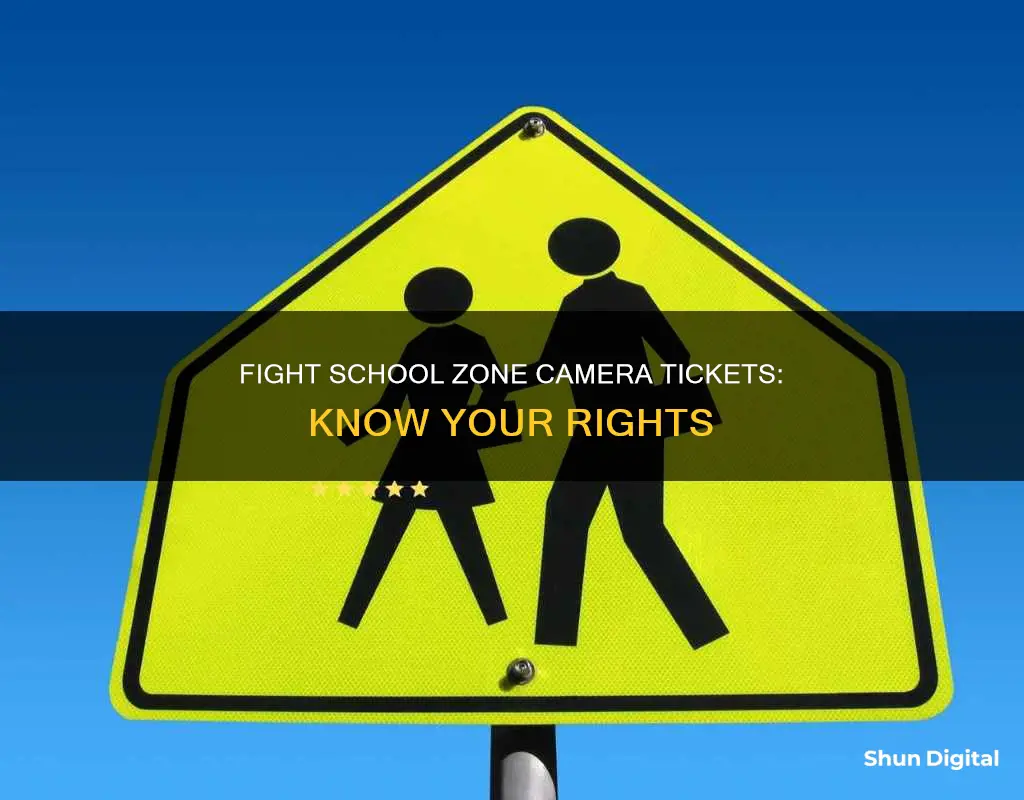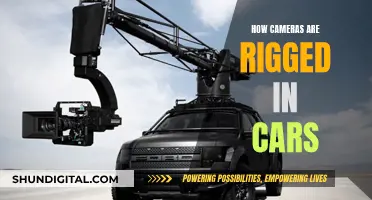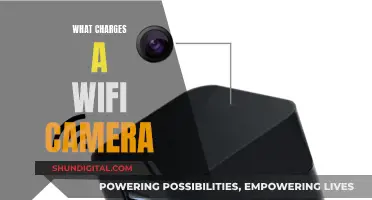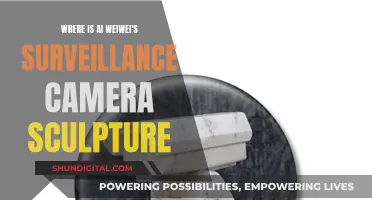
School zone speeding tickets are issued when a driver exceeds the speed limit in a designated area near a school. These tickets are typically enforced through automated camera systems that capture images of vehicles and their license plates. While the intention is to ensure the safety of children, there are instances where drivers may receive unjust or inaccurate tickets. It is important to understand your rights and the legal options available when contesting a school zone camera speeding ticket. This includes gathering evidence, reviewing local laws and regulations, preparing a written statement, and potentially requesting a hearing or court appearance. The financial implications of these tickets can be significant, with average fines ranging from $280 to over $532, in addition to higher insurance premiums for several years.
| Characteristics | Values |
|---|---|
| Reasons to fight a school zone speeding ticket | To protect your rights as a driver, to avoid costly fines, points on your driving record, and increased insurance premiums |
| How to fight a school zone speeding ticket | Gather evidence, review the ticket for errors, research local laws and regulations, prepare a written statement, request a hearing or court appearance, and follow up/appeal if necessary |
| Valid defenses | Questioning the accuracy of the camera, visibility of school zone signage, timing and duration of the school zone, driver identification, and speedometer calibration |
| Average fines for speeding in a school zone | $280 for 1-15mph over the limit, $409 for 16-25mph over, $532+ for 25mph or more over |
| Options when receiving a school zone speeding ticket | Pay the ticket, fight in court, attend traffic school, or opt for a trial by written declaration |
| Tips for fighting a ticket | Note the location and alleged speed, check if the school was in session, locate school zone markers, and consider hiring a traffic ticket dismissal service |
What You'll Learn
- Understand the ticket: Check for errors, inconsistencies, and accuracy
- Gather evidence: Photographs, videos, witness statements, and driving records can help your case
- Research local laws: Understand regulations and identify potential legal loopholes to build a defence
- Valid defences: Challenge the accuracy of the camera, question the visibility of signage, or examine the timing of the offence
- Prepare a written statement: Clearly articulate your arguments, provide evidence, and address counterarguments

Understand the ticket: Check for errors, inconsistencies, and accuracy
Understanding the ticket you received for speeding in a school zone is a crucial step in deciding how to fight it. Here are some steps to help you check for any errors, inconsistencies, or inaccuracies:
- Check the basic information: Verify the date, time, and location of the alleged violation. Confirm that you were, in fact, driving the car at that time and in that location. This is important because, in some places, the owner of the car is held responsible for the violation, regardless of who was driving.
- Review the specifics: Make sure you understand the exact code section you're cited for violating. Read up on the law to confirm that you comprehend both its elements and the associated penalties. Verify that the penalties listed on the ticket match those specified in the code section.
- Examine the images: If your notification included photos or images, review them carefully. Check if your car is clearly visible and identifiable. Also, try to determine if the images are blurry or unclear, as this could be a valid defence. If no photos were provided, you may need to request them from law enforcement after your trial is scheduled.
- Scrutinise the fine details: Review the amount of the fine you're expected to pay. Compare it with the standard fine amount for similar violations. Any discrepancies could be grounds for contesting the ticket.
- Analyse the procedural aspects: Look for any procedural errors or mistakes in the ticket issuance process. These could include incorrect information on the citation, improper notification methods, or deviations from standard practices.
- Verify the signage: Check if the signage related to speed limits and camera monitoring was clearly visible and placed correctly. Take photos of the current state of the signage as evidence.
- Question the accuracy: Challenge the accuracy of the speed camera by requesting maintenance and calibration records. If the camera was not properly maintained or calibrated, the recorded speed may be inaccurate, giving you a valid reason to dispute the ticket.
Remember, it is your right to understand the charges against you and to verify the accuracy and validity of the information presented. By carefully reviewing your ticket and identifying any inconsistencies or errors, you can build a strong case for disputing your school zone speeding ticket.
Discovering Your Camera Raw Version: A Guide
You may want to see also

Gather evidence: Photographs, videos, witness statements, and driving records can help your case
When contesting a school zone speeding ticket issued by a camera, it is crucial to gather evidence to support your case and demonstrate your innocence. Here are some steps to follow:
- Obtain photographs and videos: Collect any visual evidence that can help your case. This may include photographs or videos of the school zone, road signs, traffic signals, or any other relevant details. For example, if you were cited for running a stop sign, a photograph showing that the stop sign was obscured or difficult to see could be beneficial.
- Gather witness statements: Seek out individuals who may have witnessed the incident and can testify on your behalf. This could include passengers in your vehicle, bystanders, or other drivers who were nearby. Their statements can provide a different perspective and challenge the accuracy of the camera.
- Review your driving record: Request a copy of your driving record to demonstrate a history of responsible driving. A clean driving record or a record showing no prior speeding violations can help counter any arguments that you are a habitual speeder.
- Examine calibration records: Obtain the calibration and maintenance records of the camera that captured the alleged violation. If there are any issues or discrepancies in these records, it could indicate that the camera was not functioning correctly, casting doubt on the validity of the ticket.
- Analyze the ticket details: Carefully review the ticket for any errors or inconsistencies. Check the date, time, location, and vehicle information on the ticket. Look for any discrepancies between the details on the ticket and the actual circumstances of the incident. For example, if the ticket states a time when you were not in the school zone, this could be a strong defense.
By gathering this evidence, you can build a strong case to contest the school zone speeding ticket. Remember to keep all your documents organized and easily accessible as you prepare your defense.
Understanding Stereo Mode in Camera: Enhancing Your Photography
You may want to see also

Research local laws: Understand regulations and identify potential legal loopholes to build a defence
To fight a school zone speeding ticket issued by a camera, it is crucial to understand the local laws and regulations that govern these types of tickets. This step is essential for identifying any potential legal loopholes or inconsistencies that can be leveraged in your defence. Here are some detailed instructions to guide you through the process:
Firstly, familiarise yourself with the specific laws and regulations related to school zone camera speeding tickets in your jurisdiction. This includes understanding the maximum speed limit in school zones, the criteria for issuing tickets, and any specific requirements for operating and maintaining the camera systems. Pay close attention to technical aspects, such as calibration requirements and the frequency of maintenance and inspections. Look out for any potential errors or malfunctions that could have impacted the accuracy of speed measurement.
Next, gain a thorough understanding of the procedures that should be followed when issuing a ticket. This involves learning about the process of reviewing and approving the ticket, as well as the requirements for notifying the alleged offender. Keep an eye out for any recent changes or updates to the laws and regulations, as this information can be valuable in identifying potential inconsistencies in your defence.
Additionally, it is advisable to consult with a legal professional well-versed in traffic law or ticket defence. They can offer expert guidance and help you navigate the complexities of the legal system. Their expertise will be invaluable in identifying potential legal loopholes and building a robust defence strategy.
By conducting thorough research and seeking legal advice, you will be well-equipped to identify any weaknesses in the ticket and develop a strong defence. This step is crucial for ensuring that you have a solid foundation for contesting the school zone camera speeding ticket and protecting your rights as a driver.
Remember, contesting a school zone camera speeding ticket is not just about challenging the ticket but also about upholding your rights, avoiding financial penalties, and ensuring the accuracy of the automated camera system. By empowering yourself with knowledge and understanding the legal process, you increase your chances of successfully fighting the ticket and maintaining a clean driving record.
Polaroid Cameras: Still Being Made, Still Capturing Moments
You may want to see also

Valid defences: Challenge the accuracy of the camera, question the visibility of signage, or examine the timing of the offence
When contesting a school zone speeding ticket, it is important to identify valid defences that can help your case. Here are some key strategies to consider:
Challenge the Accuracy of the Camera:
Question the accuracy of the school zone camera by arguing that it may have malfunctioned or produced an inaccurate reading, resulting in an incorrect ticket. Research and review the maintenance records and calibration history of the camera to support your defence. If you can demonstrate that the camera was not functioning correctly, you can cast doubt on the validity of the ticket.
Question the Visibility of Signage:
Examine the placement and visibility of school zone signage. If the signs indicating the school zone were obstructed by trees or bushes, faded, or not clearly visible, this can weaken the validity of the ticket. Gather photographic evidence or witness statements to demonstrate that the signage was not adequately visible to drivers.
Examine the Timing of the Offence:
Verify the timing of the offence by obtaining the school schedule or official documentation. If the ticket was issued outside of designated school zone hours or when school was not in session, you can argue that the ticket is invalid. This defence may be particularly relevant if the ticket was issued during school holidays or outside of typical school hours.
It is important to note that each case is unique, and the effectiveness of these defences may vary depending on the specific circumstances and local laws. Consulting with a legal professional who specializes in traffic law can provide you with tailored advice and guidance on building a strong defence.
Mastering Camera Lock Modes in League of Legends
You may want to see also

Prepare a written statement: Clearly articulate your arguments, provide evidence, and address counterarguments
When contesting a school zone camera speeding ticket, preparing a clear and concise written statement is crucial. Here are some essential steps to follow:
- Understand the allegations: Begin by carefully reviewing the ticket and the specific allegations against you. Note the date, time, location, and speed limit of the alleged offense. This will help you tailor your defense effectively.
- Gather evidence: Collect any evidence that supports your claim of innocence or raises doubts about the accuracy of the camera. This may include photographs, videos, witness statements, or maintenance records of the camera. Such evidence can be pivotal in challenging the prosecution's case.
- Identify valid defenses: Based on the evidence gathered, identify the strongest defenses available to you. Common defenses include challenging the accuracy of the camera due to calibration issues, questioning the visibility of school zone signage, or arguing that the ticket was issued outside designated school hours.
- Craft a persuasive statement: Write a clear and concise statement presenting your defense. Start by introducing yourself and providing necessary details of the incident. Present your evidence and arguments, addressing each point raised in the ticket. Maintain a respectful and professional tone throughout, and avoid technical jargon to ensure your statement is easily understood.
- Proofread and edit: Before submitting, carefully review your statement for errors or inconsistencies. Ensure your arguments are well-organized and supported by the evidence. Consider seeking feedback from a trusted source to ensure clarity and effectiveness.
By following these steps, you will enhance your chances of successfully contesting a school zone camera speeding ticket. Remember to submit your statement within the specified timeframe and retain copies of all correspondence for your records.
Replacing Li-ion Camera Batteries: A Step-by-Step Guide
You may want to see also
Frequently asked questions
First, you should note down the location of the incident and the alleged speed. Then, return to the location and find out whether the school was in session at the time of the ticket. If it wasn't, you may have a strong case for getting the ticket dismissed.
You can either pay the ticket, fight it in court, opt for traffic school, or request a trial by written declaration. Paying the ticket is straightforward, but will result in higher insurance premiums for the next three years. Fighting the ticket in court may result in a reduced fine or dismissed charges, but there are no guarantees. Traffic school is a good option to keep the point off your insurance record, but the ticket will remain on your driving record. A trial by written declaration is a good first step, as it may get your ticket dismissed without any penalties, and if it doesn't work, you can still opt for traffic school or request a new trial.
You can question the accuracy of the camera, the visibility of the school zone signage, the timing and duration of the school zone, or whether you were the driver of the vehicle at the time of the offence. You can also challenge the accuracy of your vehicle's speedometer.
Gather evidence, such as photographs or videos of the area, and review the ticket for any errors or inconsistencies. Research local laws and regulations to identify potential legal loopholes. Prepare a strong written statement outlining your defence and providing any relevant evidence. You may then request a hearing or court appearance to present your case in person. If the initial hearing doesn't go your way, you have the right to appeal the decision.







